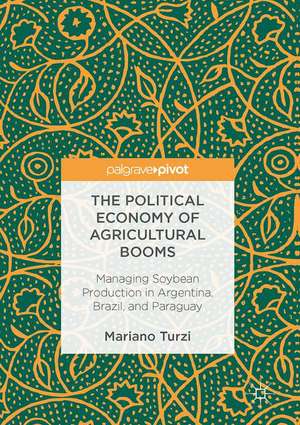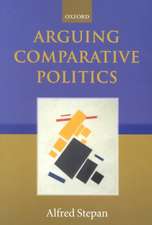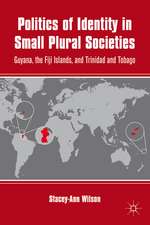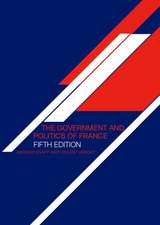The Political Economy of Agricultural Booms: Managing Soybean Production in Argentina, Brazil, and Paraguay
Autor Mariano Turzien Limba Engleză Hardback – 25 noi 2016
| Toate formatele și edițiile | Preț | Express |
|---|---|---|
| Paperback (1) | 445.88 lei 6-8 săpt. | |
| Springer International Publishing – 29 apr 2018 | 445.88 lei 6-8 săpt. | |
| Hardback (1) | 455.30 lei 6-8 săpt. | |
| Springer International Publishing – 25 noi 2016 | 455.30 lei 6-8 săpt. |
Preț: 455.30 lei
Nou
Puncte Express: 683
Preț estimativ în valută:
87.12€ • 90.97$ • 71.94£
87.12€ • 90.97$ • 71.94£
Carte tipărită la comandă
Livrare economică 15-29 aprilie
Preluare comenzi: 021 569.72.76
Specificații
ISBN-13: 9783319459455
ISBN-10: 3319459457
Pagini: 176
Ilustrații: XVII, 154 p. 5 illus., 4 illus. in color.
Dimensiuni: 148 x 210 x 16 mm
Greutate: 0.44 kg
Ediția:1st ed. 2017
Editura: Springer International Publishing
Colecția Palgrave Macmillan
Locul publicării:Cham, Switzerland
ISBN-10: 3319459457
Pagini: 176
Ilustrații: XVII, 154 p. 5 illus., 4 illus. in color.
Dimensiuni: 148 x 210 x 16 mm
Greutate: 0.44 kg
Ediția:1st ed. 2017
Editura: Springer International Publishing
Colecția Palgrave Macmillan
Locul publicării:Cham, Switzerland
Cuprins
1. The International Political Economy of Agriculture .- 2. A Super-Seeding Business .- 3. Global Trading .- 4. Coordination: Brazil .- 5. Colonization: Paraguay .- 6. Confrontation (And Beyond): Argentina.
Recenzii
“Turzi’s analysis of soybean production in the three case studies dissects the political economy of Latin America and, to an extent, that of other developing regions, examining the role played by agribusiness and its dealings through the supply side. The book notably advances the concept of a ‘soybean republic’: an economic model that highlights the geo-economic pull of transnational corporations … This book makes substantial contributions to the disciplines of agroeconomics and development. Whilst challenging, it is a rewarding read.” (Josselin Canévet, LSE Review of Books, blogs.lse.ac.uk, February, 2019)
Notă biografică
Mariano Turzi is Assistant Professor of Political Science and International Relations at Torcuato Di Tella University, Argentina. He has written on the international political economy of natural resources, introducing the “Soybean Republic” (Yale Journal of International Affairs) and the “Soybean OPEC” (Current History).
Textul de pe ultima copertă
This book offers an in-depth analysis of the international political economy of soybean production in Brazil, Argentina and Paraguay, by identifying the dominant private and public actors and control mechanisms that have given rise to a corporate-driven, vertically integrated system of regionalized agricultural production in the Southern Cone of South America. The current agricultural boom surrounding soybean production has been aided by cutting edge technologies, including biotechnology, leading to massive organizational changes in the agricultural sector and a significant rise in the power of special interest groups and corporations. The new international model of agricultural production empowers chemical and trading multinational companies over national governments and local producers. The author identifies the different social and political conflicts in Brazil, Argentina and Paraguay; comparing and contrasting political economy structures and policymaking, regulatory and institutional environments.
Mariano Turzi is Assistant Professor of Political Science and International Relations at Torcuato Di Tella University, Argentina. He has written on the international political economy of natural resources, introducing the “Soybean Republic” (Yale Journal of International Affairs) and the “Soybean OPEC” (Current History).
Caracteristici
Provides an in-depth analysis of the fastest growing agricultural markets and the unique crop that is fueling their growth – soybeans Examines a new vector of international relations: natural resources, of rapidly growing importance for political stability and geopolitical clout Analyzes the link between sudden agricultural booms and the problematic rise and empowerment of special interest groups and multinational companies that come to dominate decision-making and priority setting at the cost of national agendas Gives unique insight into some of the technological developments that have led to the creation of a new international model of agricultural production and some of its drawbacks














